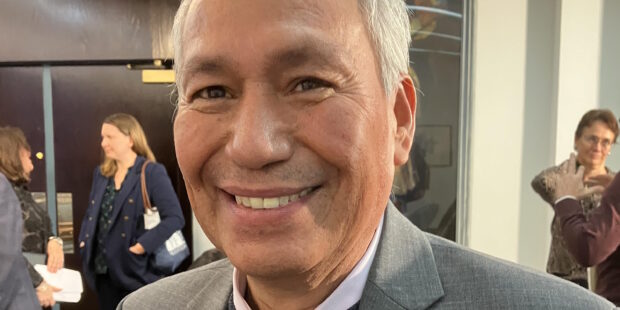
Journalists in Washington celebrated the end of a 15-year battle to protect one of our own. Mexican journalist Emilio Gutierrez Soto was feted at the National Press Club Nov. 29 after a three-judge panel overruled an El Paso, Texas, immigration judge and granted him asylum in the United States.
 Gutierrez Soto sought asylum in 2008 with his son after fleeing death threats in Chihuahua for his reporting on military corruption in Mexico. His petition for asylum was turned down by an unsympathetic judge in El Paso. Federal agents later arrested him twice, with no charges, as he appealed the decision.
Gutierrez Soto sought asylum in 2008 with his son after fleeing death threats in Chihuahua for his reporting on military corruption in Mexico. His petition for asylum was turned down by an unsympathetic judge in El Paso. Federal agents later arrested him twice, with no charges, as he appealed the decision.
The rules for obtaining asylum in the United States are pretty straight forward. According to the US government website UAS.gov, applicants must be inside the United States and able to demonstrate persecution of have a fear of persecution because of race, religion, nationality, social group or political opinion.
For some reason the threats to Gutierrez Soto nor the fact that 22 journalists ere attacked in Mexico 1998-2008, with 16 murdered for doing their jobs, according to the Committee to Protect Journalists. Since Gutierrez Soto filed for asylum another 49 journalists were killed in Mexico.
Multiple journalist groups, including the SPJ filed “friend of the court” statements on behalf of Gutierrez Soto. Representing the SPJ at the celebration in Washington was Region 2 Coordinator Stephenie Overman.
Gutierrez Soto, speaking in Spanish, thanked the people and organizations. “Profoundly grateful.”
The victory for Gutierrez Soto, however, does not appear to have changed the asylum rules to make it easier for journalists to find a safe haven in the United States.
 “I will be the wet blanket. “I think we’re not at a point of celebration,” said Lynette Clemetson, director of the Knight-Wallace Fellowship at the University of Michigan. “The systems are still in place. None of the causes have changed. We need to focus on systemic changes [in the asylum process].”
“I will be the wet blanket. “I think we’re not at a point of celebration,” said Lynette Clemetson, director of the Knight-Wallace Fellowship at the University of Michigan. “The systems are still in place. None of the causes have changed. We need to focus on systemic changes [in the asylum process].”
Penny M. Venetis, Dickinson R. Debvoise Scholar at Rutgers Law School said one way to keep up the fight is to publicize all cases. “Send court watchers to asylum cases who can say this is what happened in the room…Document…Develop team of experts to file briefs” she said.
